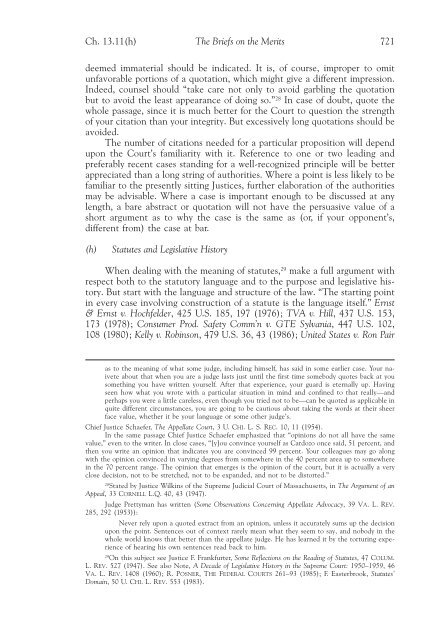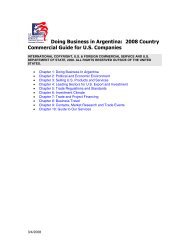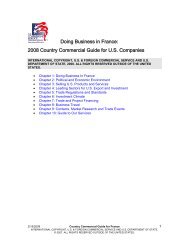Create successful ePaper yourself
Turn your PDF publications into a flip-book with our unique Google optimized e-Paper software.
Ch. 13.11(h) <str<strong>on</strong>g>The</str<strong>on</strong>g> <str<strong>on</strong>g>Briefs</str<strong>on</strong>g> <strong>on</strong> <strong>the</strong> <strong>Merits</strong> 721<br />
deemed immaterial should be indicated. It is, of course, improper to omit<br />
unfavorable porti<strong>on</strong>s of a quotati<strong>on</strong>, which might give a different impressi<strong>on</strong>.<br />
Indeed, counsel should “take care not <strong>on</strong>ly to avoid garbling <strong>the</strong> quotati<strong>on</strong><br />
but to avoid <strong>the</strong> least appearance of doing so.” 28 In case of doubt, quote <strong>the</strong><br />
whole passage, since it is much better for <strong>the</strong> Court to questi<strong>on</strong> <strong>the</strong> strength<br />
of your citati<strong>on</strong> than your integrity. But excessively l<strong>on</strong>g quotati<strong>on</strong>s should be<br />
avoided.<br />
<str<strong>on</strong>g>The</str<strong>on</strong>g> number of citati<strong>on</strong>s needed for a particular propositi<strong>on</strong> will depend<br />
up<strong>on</strong> <strong>the</strong> Court’s familiarity with it. Reference to <strong>on</strong>e or two leading and<br />
preferably recent cases standing for a well-recognized principle will be better<br />
appreciated than a l<strong>on</strong>g string of authorities. Where a point is less likely to be<br />
familiar to <strong>the</strong> presently sitting Justices, fur<strong>the</strong>r elaborati<strong>on</strong> of <strong>the</strong> authorities<br />
may be advisable. Where a case is important enough to be discussed at any<br />
length, a bare abstract or quotati<strong>on</strong> will not have <strong>the</strong> persuasive value of a<br />
short argument as to why <strong>the</strong> case is <strong>the</strong> same as (or, if your opp<strong>on</strong>ent’s,<br />
different from) <strong>the</strong> case at bar.<br />
(h) Statutes and Legislative History<br />
When dealing with <strong>the</strong> meaning of statutes, 29 make a full argument with<br />
respect both to <strong>the</strong> statutory language and to <strong>the</strong> purpose and legislative history.<br />
But start with <strong>the</strong> language and structure of <strong>the</strong> law. “<str<strong>on</strong>g>The</str<strong>on</strong>g> starting point<br />
in every case involving c<strong>on</strong>structi<strong>on</strong> of a statute is <strong>the</strong> language itself.” Ernst<br />
& Ernst v. Hochfelder, 425 U.S. 185, 197 (1976); TVA v. Hill, 437 U.S. 153,<br />
173 (1978); C<strong>on</strong>sumer Prod. Safety Comm’n v. GTE Sylvania, 447 U.S. 102,<br />
108 (1980); Kelly v. Robins<strong>on</strong>, 479 U.S. 36, 43 (1986); United States v. R<strong>on</strong> Pair<br />
as to <strong>the</strong> meaning of what some judge, including himself, has said in some earlier case. Your naivete<br />
about that when you are a judge lasts just until <strong>the</strong> first time somebody quotes back at you<br />
something you have written yourself. After that experience, your guard is eternally up. Having<br />
seen how what you wrote with a particular situati<strong>on</strong> in mind and c<strong>on</strong>fined to that really—and<br />
perhaps you were a little careless, even though you tried not to be—can be quoted as applicable in<br />
quite different circumstances, you are going to be cautious about taking <strong>the</strong> words at <strong>the</strong>ir sheer<br />
face value, whe<strong>the</strong>r it be your language or some o<strong>the</strong>r judge’s.<br />
Chief Justice Schaefer, <str<strong>on</strong>g>The</str<strong>on</strong>g> Appellate Court, 3 U. CHI. L. S. REC. 10, 11 (1954).<br />
In <strong>the</strong> same passage Chief Justice Schaefer emphasized that “opini<strong>on</strong>s do not all have <strong>the</strong> same<br />
value,” even to <strong>the</strong> writer. In close cases, “[y]ou c<strong>on</strong>vince yourself as Cardozo <strong>on</strong>ce said, 51 percent, and<br />
<strong>the</strong>n you write an opini<strong>on</strong> that indicates you are c<strong>on</strong>vinced 99 percent. Your colleagues may go al<strong>on</strong>g<br />
with <strong>the</strong> opini<strong>on</strong> c<strong>on</strong>vinced in varying degrees from somewhere in <strong>the</strong> 40 percent area up to somewhere<br />
in <strong>the</strong> 70 percent range. <str<strong>on</strong>g>The</str<strong>on</strong>g> opini<strong>on</strong> that emerges is <strong>the</strong> opini<strong>on</strong> of <strong>the</strong> court, but it is actually a very<br />
close decisi<strong>on</strong>, not to be stretched, not to be expanded, and not to be distorted.”<br />
28Stated by Justice Wilkins of <strong>the</strong> Supreme Judicial Court of Massachusetts, in <str<strong>on</strong>g>The</str<strong>on</strong>g> Argument of an<br />
Appeal, 33 CORNELL L.Q. 40, 43 (1947).<br />
Judge Prettyman has written (Some Observati<strong>on</strong>s C<strong>on</strong>cerning Appellate Advocacy, 39 VA. L. REV.<br />
285, 292 (1953)):<br />
Never rely up<strong>on</strong> a quoted extract from an opini<strong>on</strong>, unless it accurately sums up <strong>the</strong> decisi<strong>on</strong><br />
up<strong>on</strong> <strong>the</strong> point. Sentences out of c<strong>on</strong>text rarely mean what <strong>the</strong>y seem to say, and nobody in <strong>the</strong><br />
whole world knows that better than <strong>the</strong> appellate judge. He has learned it by <strong>the</strong> torturing experience<br />
of hearing his own sentences read back to him.<br />
29On this subject see Justice F. Frankfurter, Some Reflecti<strong>on</strong>s <strong>on</strong> <strong>the</strong> Reading of Statutes, 47 COLUM.<br />
L. REV. 527 (1947). See also Note, A Decade of Legislative History in <strong>the</strong> Supreme Court: 1950–1959, 46<br />
VA. L. REV. 1408 (1960); R. POSNER, THE FEDERAL COURTS 261–93 (1985); F. Easterbrook, Statutes’<br />
Domain, 50 U. CHI. L. REV. 553 (1983).












